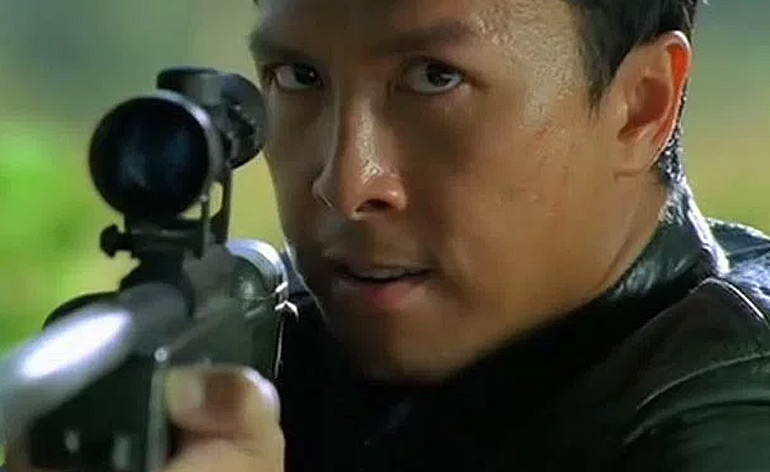
Beware! This review contains spoilers!
Hong Kong’s dynamic duo of action directing superstar Donnie Yen and director Wilson Yip score with another hard-hitting action thriller of epic proportions in 2007’s Flash Point. Little can prepare you for the hardcore thrills of watching Yen take on The Matrix‘s magnificent Collin Chou. The duo star in a standard revenge tale, and with the help of some impressive mixed martial arts, deliver one of the most amazing confrontations ever. Thanks to the pure kung-fu magnetism of the leads, and the way in which director Yip cuts directly to the chaos, Flash Point really delivers. It literally kicks (and punches) the tired Asian crime-drama genre up a few dynamic notches!
Cast
In Flash Point, Detective Sergeant Ma Jun, played by Donnie Yen, is the man. Yen is clearly at his most powerful and preening, epitomised by the scene in which Yen gloats shirtless on the beach just because, well, he’s a cool human specimen and that’s what he does! Louis Koo chain-smokes his way through the movie as the nonchalant Wilson, occasionally waking up and realising he’s supposed to act – to which he usually responds by yelling. Fan Bingbing is luminous as Koo’s love interest, Judy and is photographed in extremely flattering ways throughout. The manipulative and calculating Vietnamese drug-pushing brothers – played by Collin Chou, Xing Yu, and Ray Lui – seem to be having great fun with their parts, and it’s their colourful performances that help keep Flash Point entertaining during its more slow-paced moments.
Plot
Flash Point’s narrative begins before Hong Kong’s handover to the PRC in 1997. Wilson is working undercover in a bustling Mong Kok nightclub. He’s on the case of three Vietnamese brothers – Archer, Tony and Tiger – who are busy discussing a drug deal with Sam, a rival gang leader. Ma Jun, a serious criminal investigations detective, raids the nightclub to investigate, and winds up fighting against Wilson, his partner who quickly succumbs to a submission manoeuvre. Sometime after, Wilson takes the three brothers to a driving range, where they’re confronted by Sam and his gang who’ve become impatient over a delayed shipment of drugs from the brothers’ native Vietnam. The brothers look to be outnumbered until Tony springs from nowhere to add a psychotic injection of violence to the standoff. The resulting golf-fu chaos ends with Sam’s cronies in flight. Some of the more senior members of the brothers’ gang try to pacify their reckless behaviour. But when Tony threatens the livelihood of their loved ones, the elders stand down.
Wilson then unwittingly accompanies Tiger to dispose of Sam in his car. After an incredibly violent and bloody struggle with an enormous knife, Wilson intervenes in the nick of time under the pretence of fleeing from cops in hot pursuit. Recovering in a hospital bed, Sam informs the rather rotund Inspector Wong, that he is willing to testify against Tony. With Sam prepared to testify against the gang, the Hong Kong police are able to convince the elders to turn against the brothers. Sensing something peculiar, Tony takes Tiger and Wilson to their headquarters to recover the drug money. Soon after, Archer is arrested by Hong Kong police in Wan Chai, while elsewhere, Tony and Tiger discover that Wilson is a mole and attempt to get rid of him, hospitalising him in the process. When Archer is taken to court, he is charged with smuggling, infliction of grievous bodily harm and triad activities, denied bail and forced to hand over all his travel documents so as to prevent him travelling outside Hong Kong before his hearing.
Three months later, Wilson is discharged from hospital. Meanwhile, Tony and Tiger conspire to murder Wilson and Sam so as to prevent their testimonies. When Inspector Wong and Ma come to visit the recuperating Wilson, an incredibly humorous sequence involving a home-made chicken bomb and a bumbling delivery-man-come-terrorist ensues. But the sheer nuttiness of planting a primitive remote-controlled bomb inside a delivery of take-out chicken is diminished by the mayhem when it finally goes off. Inspector Wong is blown to smithereens and Wilson’s love interest, Judy suffers serious injuries. Wilson and Ma then become determined to exact revenge on the Vietnamese brothers. In the interim, the brothers are serving out their own twisted form of justice on the elders who betrayed them, one by one. With Archer’s hearing soon to commence, Tony and Tiger disguise themselves as janitors in order to sneak into the hospital where Wilson is being protected by police. Ma manages to foil Tiger’s plot and save Wilson’s life in the process. An absolutely riveting pursuit ensues through the spectacular streets of Hong Kong, and concludes in a brutal encounter of vicious knee thrusts, stinging jabs, and one unforgettable suplex through a table. Needless to say, Ma comes out on top.
However, while Ma was busy pummeling Tiger to death, Tony had kidnapped Judy and is holding her hostage in an undisclosed location. During the hearing, Wilson refuses to testify due to the threat against Judy, and the case is dismissed for lack of evidence. Wilson then attempts to rescue Judy, but is captured and savagely beaten by Tony and his gang. Once Archer walks free, Ma holds him captive, and calls Tony for an exchange of hostages, leading to a Mexican standoff in a majestic riverside village. Upon arrival, Ma proceeds to singlehandedly destroy the remaining gangsters in what is a truly high-octane gun-fu exchange. Ma then engages in an exhausting and dramatic brawl with Tony. In one of the most impressively choreographed fight scenes this reviewer has ever come across, Ma and Tony put themselves through seemingly endless and unbearable pain and break nearly every inanimate object in sight in order to lay destruction to one another. At last, Ma gets the upper hand and strangles Tony to unconsciousness in order to finally arrest him.
Action
Flash Point features some of the best and most hard-hitting action scenes of the past twelve years. Donnie Yen’s fight choreography is an exciting blend of MMA-style takedowns and his own trademark fluid-like wu shu and taekwondo. For his conception of Flash Point’s major fight sequences, Yen worked alongside an international group of martial artists. This highly successful collaboration earned him “Best Action Choreography” honours at the 27th Hong Kong Film Awards and the 2008 Golden Horse Film Awards, and deservedly so; Flash Point is an action-thriller that has it all: blistering one-on-one combat, bloody gunplay and riveting car chases. There is even a brief chase scene with elements of parkour, which results in Yen going postal on Xing Yu in a restaurant-set showdown that could induce head trauma. In fact, Yen and Yu’s fight probably turns out to be the film’s most effective. It’s short, sweet, and charged with an undeniable emotional energy unmatched by perhaps even the climactic showdown!
The majority of the action in Flash Point is crammed into the third act, which results in an orgy of violence, including a scene in which Yen wields a sniper rifle that’s almost as big as he is, that should satisfy any action junkie. The final bout between Yen and Collin Chou, which extends over eight minutes, is, simply put, one of the most bone-crunching, jaw-dropping, bloody-up-your-nose fight scenes in over a decade. It’s essentially like watching a UFC match, except they aren’t fighting in a cage and there are no rules. Both Yen and Chou put their all into this fight, their stunt work and choreography has scarcely been topped or even equalled by most of today’s martial arts movie offerings. There’s no shaky cam or quick cut editing here – camera work is fluid and, although you’ll notice the occasional stuntman stand-in on repeated viewings, everything looks painfully real…!
In one of those rare instances where a single scene supplants much of the movie that came before, Yen and Chou redefine the big screen brawl with their kinetic, intense display. Besides completely owning Chou with his powerful legs (Ma seems to have a thing for clamping people’s necks with his scissor-like thighs), Yen repeatedly smacks Chou into whatever stationary objects are nearby, whether they be cinder blocks, supporting beams or cement walls. Following that, Chou usually writhes in pain on the floor, while Yen stands (or dances) around, waiting for Chou to get back up. Rinse and repeat! Those who like to watch someone get smashed into floors, walls, bricks, and beams while someone else prances around victoriously should get a kick out of Yen’s punishment of Chou. Never has a man had more trouble with architecture or flamboyant grandstanding than Collin Chou!
Summary
There’s no denying that the plot in Flash Point does not feel entirely well thought-out. Scenes seem to follow each other without a clear idea of what the story is about. Is Louis Koo the protagonist or is Donnie? The audience can’t really decide and neither, it seems, can the filmmakers. But when the action is as bone-crunching as it is here, do people really care about the story anyway? At the end of the day, Flash Point attempts to prioritise realism, but is still very much focused on style. Donnie and his crew are perfecting their craft and are to my mind, definitely among the very top action crew in Hong Kong, this killer kung-fu flick proves it!
Trivia
- Due to the intensity and complexity of their final fight sequence, both Donnie Yen and Collin Chou agreed it was the hardest shoot they had ever endured in their respective careers
- In the parking garage scene, it took Yu Xing nearly 39 takes to complete the seemingly simple shot of him leaping over the gate. Yen has attributed Yu’s difficulty to nerves, as this was his first movie with Yen, and the scene was his first to be shot in the film. An outtake of Yu crashing through the gate and breaking it is included in the film’s final credits as outtakes.
- Yen originally planned to stage a much more extensive fight scene at the driving range, which would have involved a longer brawl between the two gangs, followed by his character showing-up to stop it. The scene was shortened due to lack of funds and Yen’s inability to gain permission to shoot additional scenes at the location.
- Director Wilson Yip originally shot a different ending, in which Yen was killed following his final fight with Chou. After screening it, he decided to change the ending to a more positive one, with Yen surviving.
Quotes
Gang elder: “We took you in when you were refugees”
Tony: “We were stuck in the refugee camp like prisoners. Why did we riot? Because we wanted our home. If anyone wants us to leave today, they have to fight us”
Wilson: “What a heavy gift”
Policeman 1: “Definitely heavier than Inspector Wong”
Female police officer: “I need a statement from you. You killed the suspect”
Ma Jun: “Arrest me then”
Ma Jun: “Have I ever busted the wrong guy? I’ll leave the answer to the judge. My duty as a cop is to catch thieves”



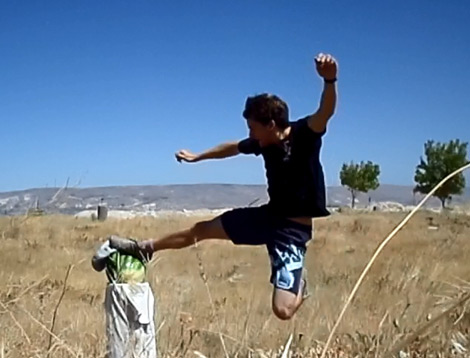

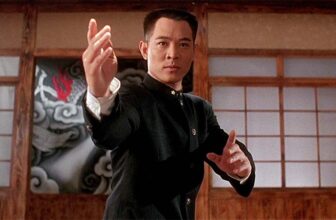
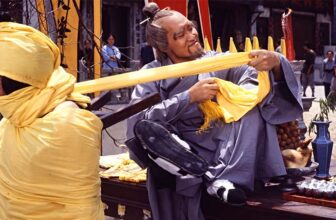
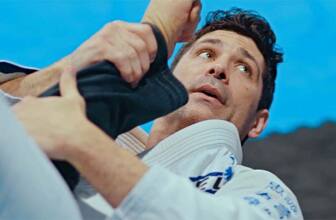
Excellent review, sir! Between “Flash Point”, “Sha Po Lang, and the “Ip Man”, Donnie Yen raised the bar and completely reinvigorated action choreography in Hong Kong!